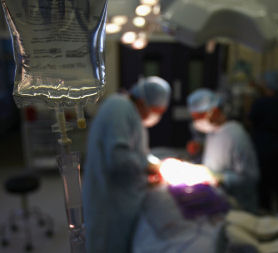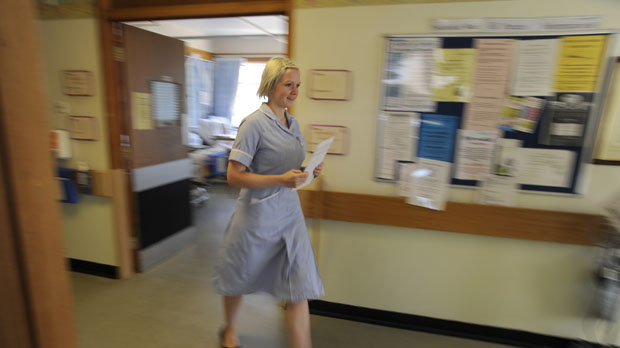NHS surgeon: Lansley reforms are a ‘phony revolution’
NHS frontline blog: “This is a phony revolution, driven not by patients or clinicians, but by business interests,” writes trauma surgeon Catherine Blake for Channel 4 News.

Following the publication of the health and social care bill by Health Secretary Andrew Lansley, patients and healthcare professionals are left with many more questions than answers. A new, better NHS is the promise: freed from unaccountable bureaucrats, with patients and doctors in the driving seat – who wouldnt want that?
I am a doctor, a surgeon, but not yet a consultant. I have worked in the NHS full time for the last seven years, and have witnessed first-hand the impact on patients of the last governments policies; the madness of rigid political targets and the creeping involvement of the private sector, which has led to a lack of continuity and fragmentation of patients care. These arguments are opaque and full of jargon: what does this really mean in practise?
It is head-bangingly frustrating for me, and patients are understandably outraged at this idiotic system.
As a concrete and mundane example, I sit in orthopaedic clinics seeing patients, asking questions, examining, making a diagnosis and planning treatment in conjunction with each one. Routinely, the patient arrives having already had key diagnostic tests organised by their NHS GP, increasingly through a private companies. More often than not, we in hospital outpatients have no access to the results. I then have to send the patient for a repeat scan or test, further delaying their treatment.
It is head-bangingly frustrating for me, and patients are understandably outraged at this idiotic system. But they will have been offered a choice as to where to have the tests done: they (reasonably) choose the quickest route and (reasonably) expect that this will expedite decision making when they reach their specialist. Not so.
Channel 4 News special report – NHS reforms and cuts
There is no automatic link-up between NHS IT systems and those of other providers or even other NHS hospitals. This is the result of looking at healthcare as discreet units to be bought, rather than as a joined up process. This approach does, however, line the pockets of private health providers, whilst wasting patients’ and doctors’ time.
Lansley’s proposals sound good to doctors who watch their patients’ care suffer and to nurses buried under piles of tick-box paperwork, too busy to be able to deliver proper care on the wards. It is music to our ears. The idea of a leaner health service, with less interference, freeing doctors and nurses to deliver excellent care, money saved on red-tape freed up for the frontline. There is much to be welcomed in the bill, including a focus on quality and the use of patient centred outcome measures. It is seductive.
If a politician asked me how to improve hospital care I would say free up nurses to nurse and staff wards to a safe level.
But will doctors really be in control and able to put quality and safety at the centre of the health service? The mechanism for delivering this revolution- the panacea – is the removal of all barriers to private sector companies seeking to profit from outsourced NHS contracts. Coupled to reforms devolving budgets and responsibility to local GPs working in consortia is a requirement to give open access to the private sector to bid for public work and funding. It will remain a National Health Service in name only.
This accelerates the market-orientated changes to the service championed by Tony Blair. Public and professionals alike have reason to be very, very concerned.

If a politician asked me how to improve hospital care I would say free up nurses to nurse and staff wards to a safe level, ensuring patients can be comfortable, clean and cared for with dignity. Increase capacity so that single-sex wards can be a reality, and allow the bed occupancy rate to be reduced, thereby reducing hospital acquired infections.
Restore the link between junior doctors and their consultants. The medical firm of doctors has been consigned to history by the move to shift work and by young doctors being assigned by managers to cover many wards full of patients not known to them, to save money. This is disastrous for patient care and for medical training. It means that the doctors can never become familiar with their patients, but are simply putting out fires across the hospital, particularly at night. But they never have asked me, or anyone I work with. The coalition has ignored the concerns of the British Medical Association and the Royal College of Nursing. This is a phony revolution, driven not by patients or clinicians, but by business interests. Less of a cure, I would say, more like second dose of the same poison.
This is a phony revolution, driven not by patients or clinicians, but by business interests.
In the white paper, Lansley makes no mention of the involvement of Mars, Unilever and Diageo corporations – specialised in the sale of confectionary and alcohol – in public health discussions and planning meetings since September last year. No mention either, is made of hundreds of thousands of pounds in donations to the Conservative Party from private health companies.
The prime minister and the health secretary insist that we need these reforms now, but where is the evidence that private contractors in the NHS improve care? I have certainly never seen it in practise, or in print. In fact, the work of Allyson Pollock, Professor and Director for the Centre for International Public Health Policy at the University of Edinburgh demonstrates painstakingly that privatisation within the service damages patient care.
There is a conflict between cost-savings, quality and safety. Outsourcing health services to private companies is fraught with difficulty, not least because it adds to the layers of unaccountability.
In 2008 David Gray was killed by lethal injection by a Nigerian doctor registered in Germany, working for a private firm called Take Care Now, on behalf of the NHS in Cambridgeshire. The doctor, Daniel Ubani, was unfamiliar with diamorphine and its administration. In 2009 Jamie Merrett, who was tetra-plegic and ventilator-dependent after an accident, was irreversibly brain damaged after his care in Wiltshire was outsourced. An agency nurse employed by them accidently turned off his ventilator and then was unable to resuscitate him with manual equipment, because she lacked the necessary training. Inquests, enquiries, hand-wringing and frantic buck-passing are of no use to these patients. These things should never have been allowed to happen.
Patient choice is the Trojan horse here, for privatisation. In my experience, given the option, people all make the same choice – they want good care and the best treatment, in reasonable time, delivered by trained, well-mannered and caring professionals.
In devolving responsibility for provision of services to local GP consortia, the government is abdicating responsibility for delivering that for all patients. GP practices are businesses contracted to the NHS.
The transfer of £80 billion pounds of public money to GP consortia represents a profound shift in power away from the NHS and the principles which underpin it.
Put another way, the NHS currently employs GPs. In the future, GP practices will employ the remnants of the NHS or choose instead to employ private contractors do the work, and their decisions will be subject to the laws of trade and competition, rather than based strictly on clinical concerns.
The transfer of £80 billion pounds of public money to GP consortia represents a profound shift in power away from the NHS and the principles which underpin it. This will be an unbridled open market in health care.
Managers will still be employed, but in addition to the usual conflicts, the profit motive will become integral in all operations of health service across England. Where a family doctor may want to refer you to your local hospital, or to a well thought of specialist department, a quango-Monitor, previously responsible for enforcing targets in foundation hospitals-may veto that decision on the basis of EU competition law.
All of this, it is claimed, will drive up standards and reign in prices. It seems unlikely. That is not what happened when railways were privatised. It raises the spectre of a race to the bottom in health, because the profit margin will be protected. Hands up anyone for the cheapest possible knee replacement, performed by the most cheaply available surgeon?
Catherine Blake is a pseudonym.